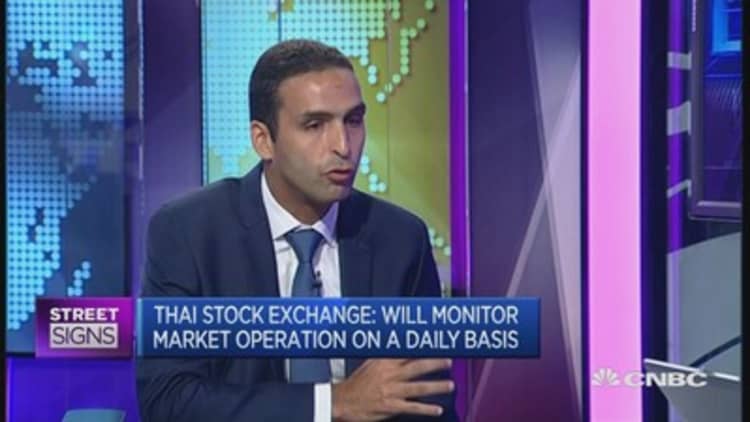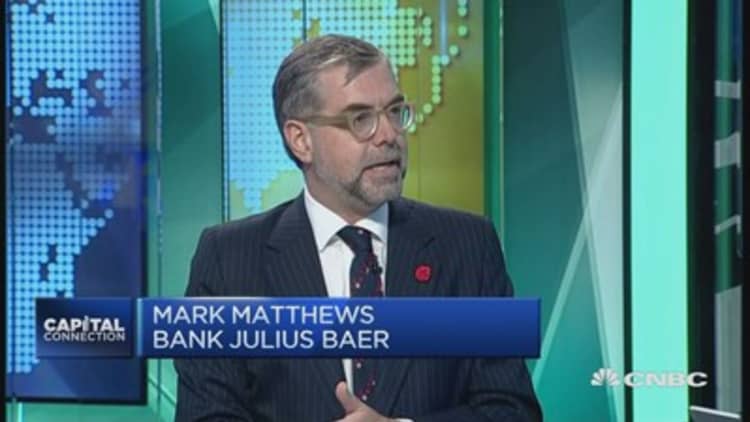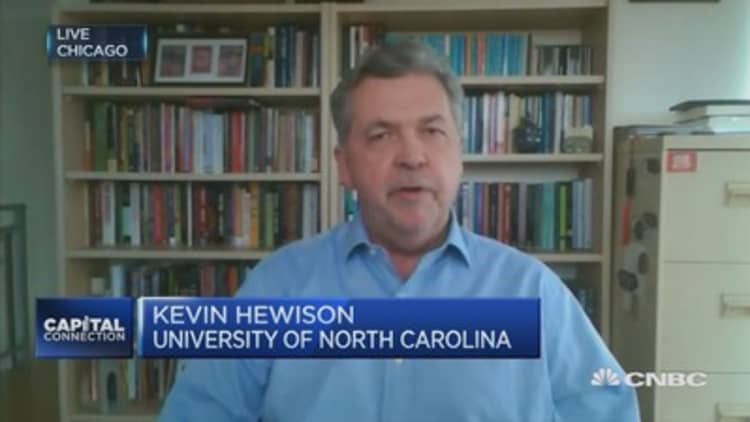

Thai shares and the baht were up on Friday, rebounding after a volatile week in which news of the king's deteriorating health triggered fears about political stability in the Southeast Asian country.
King Bhumibol Adulyadej died on Thursday night at the age of 88, and after Thailand's junta said that security was its top priority, the Stock Exchange of Thailand (SET) Index traded up over 4 percent on Friday, while the Thai currency gained over 1 percent against the dollar.
In Bangkok, although Thais were visibly mourning, activity appeared to go on as normal, with construction sites rumbling and the traffic as frenetic as ever.
But with the country under military rule, the king's stabilizing force gone and successor Crown Prince Maha Vajiralongkorn failing to command the same devotion as his father, there are many uncertainties in Thailand's outlook.
Here are analysts' thoughts on the investment opportunities and risks, as Thailand starts a new era.
DBS Bank
"Investors are clearly concerned about what may come after King Bhumibol's reign ends. To be sure, the economy is not doing too well," DBS said.
Private sector demand is growing at just 2.5 percent annually, while manufacturing and agriculture, which employ about 50 percent of the workforce, have struggled in recent years, it explained. Despite making up 35 percent of gross domestic product (GDP), both sectors combined to contribute only 6 percent of GDP growth in the past three years and the only bright spark had been the tourism sector, which could now be affected by the one-year mourning period, the Singapore-based bank added.
More important, however, were the political concerns, DBS said.
"The next election, supposed to take place next year, may get delayed again. Security concerns continue to grab the media headlines and the public wonders how the rebellious south will react to the passing of the king. There are also lingering uncertainties about the Crown Prince's relationship with the military government."
For now however, DBS said there was "no compelling reason" to revise its 3.3 percent and 3.5 percent GDP growth forecasts for 2016 and 2017 respectively.
"But downside risks remain. Now that King Bhumibol has passed away, the list of uncertainties gets even longer," DBS cautioned.
Deutsche Bank
"The passing of the King of Thailand yesterday should help put an end to the sharp volatilities in the stock market that began in September," Deutsche Bank said. "Provided that the next two to three months remain relatively calm, we could be back on track to restoration of civilian rule by the end of 2017."
The junta's decision to keep the stock market open on Friday was "welcome surprise," the bank added.
The German bank kept its SET Index target intact at 1,600 points by end-2017, from around 1,470 now, although it warned that there may be some downside risk to its earnings per share forecast due to the suspension of entertainment activities.
With an official one-year mourning period for the late king, the bank said entertainment activities could be suspended for up to three months - longer than the 30-day official requirement. The media sector was also likely to be hit due to cancellation of major concert events, the bank added.
"Although Thai citizens were advised to 'act appropriately' regarding how long they should mourn, we believe the majority will choose to mourn for at least six to nine months out of respect for the late king," Deutsche forecast.
Goldman Sachs
The investment bank retained its underweight call on Thai assets due to growth risks, still-high valuations and elevated position risk amid political uncertainties.
Goldman's analysts cited an "elusive" broad growth recovery, subdued private investment and consumption, and weak export growth as weighing on the economy.
"Our economists see limited positive catalysts for Thailand's growth story over the next few quarters," they wrote, forecasting that GDP growth would continue in the low 3-percent range, led by government spending and tourism which remained the only bright spot in the economy.

Mizuho Bank
"The one year of mourning declared may inadvertently be a double-edged sword," Mizuho said. "On one hand it provides welcome breathing space for the successor to gain political footing and try emulating the late king's universal appeal. Yet on the other, if this period of mourning is used as a pretext to defer elections planned for next year, it could cast a shadow on investor confidence."
Risk premium was likely to rise, the Japanese bank forecast, although the immediate impact on the economy was hard to identify and quantify.
"One risk is that consumer confidence, which has been recovering at a gradual pace since June, may slip in the near term as the population mourns their beloved king. What's more, investments could also soften around the edges if business plans and capex are deferred whilst longer-term clarity being sought," Mizuho cautioned.
Persistent global economic headwinds also weighed on the outlook, the bank added.
Oxford economics
Oxford Economics said that it would stick with its current forecasts, despite the "likely economic pause in the very near term." The consultancy forecast Thailand's GDP to grow by 3.1 percent this year and next.
"Market volatility should also subside if the transition is smooth, while the currency will be supported by Thailand's large current account surplus," the consultancy said.
"One key reason why we have not changed our growth forecast is that it is already fairly subdued, with lackluster investment and soft consumption amid cautious sentiment, partly due to the long-standing political uncertainty."

